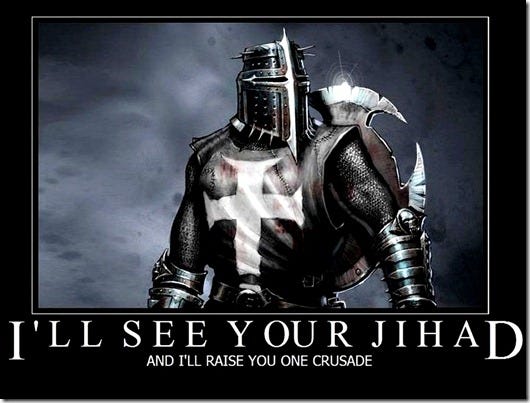By Jeremy Kotkin (Lieutenant Colonel, US Army) at The Bridge
7 September 2014
Kill and contain our foes. Give war another chance!
This was originally posted by Fabius Maximus on his blog as a response to Jeremy Kotkin’s recent post on The Bridge. We appreciate the folks over at FM allowing us to cross post it.
Summary: Today we have an article from the dark side of America’s soul (with deep roots in our history) enticing us into evil. War erodes our strength, and after 13 years of the War on Terror our defenses against evil are quite thin. Voices like this, although seldom so vivid, probably will dominate debate among the presidential candidates of both parties during the next two years.
“Kill them all; let God sort them out.” — Loose translation of phrase attributed to Papal legate Arnaud Amalric before the Massacre at Béziers, in France at the start of the Albigensian Crusade.
At an early intergovernmental meeting {1962} on the importance of psychological warfare, one of {General} Harkins’ key staffmen, Brigadier General Gerald Kelleher, quickly dismissed that theory. His job, he said, was to kill Vietcong. But the French, responded a political officer named Donald Pike, had killed a lot of Vietcong and they had not won. “Didn’t kill enough Vietcong,” answered Kelleher.
— From The Best and the Brightest, David Halberstam (1972)
I urge you to read the article discussed here, and contemplate the future of America. At 3400 words, it’s too complex for an accurate summary beyond “kill kill kill”. The author hits all the usual tropes of US bloodlust. General Sherman. NAZIs. Good (us) and evil (them). Amnesia about history. But bad wars corrupt the soul, and the US has fought three bad wars since Korea The evidence mounts that we are in a perilous state. I’ve included only a few comments, as the text sings a song familiar to anyone who know of humanity’s blood-soaked history.
Two notes to remember as you read.
This article advocates doing what Bin Laden hoped we do. This is why 9/11 was the most effective single military operation in the history of the world.
Despite what the author claims, the record of foreign armies fighting local insurgents is one of almost uniform failure.
“A Thought Experiment on the Hegelian dialectic towards ‘Total’ Strategy Development”
Lieutenant Colonel Kotkin opens with sound analysis. This excerpt just sets the stage for the main body.
Let’s talk counterinsurgency and ISIS. Not the “population-centric” fantasy of hearts and minds made popular by FM 3–24, David Petraeus, and liberal American idealism, but real counterinsurgency. Now that a cohesive group of psychotics and organized criminals have thrown the Middle East yet again into a cauldron of seething and violent cultural atavism, what should the world, and the U.S. specifically, do about it? … What do we do about the endemic issue of which ISIS is yet simply another symptom?
The body of the article reads like pre-WW1 literature looking forward to the Great War. It’s a chain of dubious assumptions from the danger posed by ISIS to the effectiveness of war. Major Kotkin starts with a “Thesis”.
… We’ll keep fighting this cancer {ISIS} with one hand tied behind our back. Yet cancer requires a wholesale attack. Even “targeted” anti-cancer therapies try to root out the cancer from the starting place – the genetic source. We have never attempted and will probably not attempt to do this. … We’re afraid of global public opinion. Yet the way we’ve been handling our Global War on Terrorism has been a failure. Something new is needed. Something systemic and something complete.
… What follows is a thought experiment on a different course of action and a different strategy. … What follows is a game-changer and as distasteful as it may initially seem, it represents a course of action, albeit extreme, to deal with an extreme and lasting problem.
… Beyond all the handwringing at State and Defense about what is too little or too much, or messaging, or narratives, or soft power, or population-centric strategies that focus on the human element, the answer always was right in front of us.
Then he gives an “Antithesis”, filled with talk about war and total war — but artfully vague about operational details.
 “Bleeding Eye” by C. Bayraktaroglu
“Bleeding Eye” by C. Bayraktaroglu
If Islamic extremism is a cancer that will not otherwise die on its own … we must eradicate it where we can and contain it where we cannot.
… The key term of {the Axis powers’} surrender was ‘unconditional.’ War would be waged, ideas would be killed, any hopes or fantasies of continuing to fight would be crushed. This was accomplished through wholesale, industrial violence. … We know total war works. We also know the limited war actuated by the Global War on Terrorism and the Authorization for Use of Military Force is an unqualified failure beyond any tactical measure.
… If we are to address ISIS militarily, which was the original question posed here, we must address it wholly, unconditionally, and unreservedly. That is the choice we must make. … We did not ask for this war but this region of the world obviously has decided to visit it upon us and our allies.As General William Tecumseh Sherman stated in his letter to the civic leaders of Atlanta before he burned it to the ground in 1864:
“You cannot qualify war in harsher terms than I will. War is cruelty, and you cannot refine it; and those who brought war into our Country deserve all the curses and maledictions a people can pour out. I know I had no hand in making this war, and I know I will make more sacrifices to-day than any of you to Secure Peace. …The United States does and must assert its authority, wherever it once had power; for, if it relaxes one bit to pressure, it is gone…”
For us, our nation, our children, and the future prosperity of the rest of the modern world, this cancer must be stamped out.
He repeatedly refers to Islamic fundamentalism as a cancer, but notes that we’ve helped spread it. In fact there’s little evidence of its attractiveness except in lands destabilized by the US and Israel. Biological metaphors like “cancer” are useful propaganda but provide no useful insight.
He concludes with an coyly written “Synthesis” involving what sounds like ethnic cleansing against Arab Americans, and war with some or all of our allies of the Gulf States.
We cannot continue to look at treating the symptoms and not the causes. … the long term risk to our global economic prosperity is threatened by the continuing … embodiment of radical Islamism … enabled by Islamic monarchies and theocracies whose interests are inimical to our own. We can continue to muddle through dealing with this threat or we can take it head on. If we are to address this we must address it systemically. Like a cancer.
… Yet a two-pronged and long-term strategic approach can work. First, “the gloves are off” military operations to utterly destroy the concept of jihad and Islamic conquest in the places we can reach and, secondly, thoroughly contain the cancer in the places we cannot reach.
… if we choose to take the longer view, then ‘go big or go home.’ Unconditional surrender and containment. We know that works quite well.
This shows astonishing amnesia of history. War works, sometimes — as it did in WW2. But such wars are rare. More often they prove futile and destructive. From the Peloponnese War through the 30 Years War to WWI. Don’t listen the sirens of war as they confidently sing of victory through war.
He who fights with monsters should look to it that he himself does not become a monster. And when you gaze long into an abyss the abyss also gazes into you.
— Aphorism 146 in Nietzsche’s Beyond Good and Evil (1886)
For More Information
The picture “Bleeding Eye” by C. Bayraktaroglu is posted with permission.
(a) Posts about Grand Strategy:
The Myth of Grand Strategy, 31 January 2006
(b) Posts about bin Laden:
Important: Was 9/11 the most effective single military operation in the history of the world?, 11 June 2008
Bin Laden wins by using the “Tactics of Mistake” against America, 6 February 2011
A brief note about the death of bin Laden, 2 May 2011
(c) These posts about AQ remain relevant today:
Important: Lessons Learned from the American Expedition to Iraq, 29 December 2005 — Is al Qaeda like Cobra, SPECTRE, and THRUSH?
The enigma of Al Qaeda. Even in death, these unanswered questions remain important, 15 September 2008
“Strategic Divergence: The War Against the Taliban and the War Against Al Qaeda” by George Friedman, 31 January 2009
Can we defeat our almost imaginary enemies?, 10 December 2009
“The Almanac of Al Qaeda” – about our foe, 16 June 2010
Does al Qaeda still exist?, 31 March 2011
A look at al Qaeda, the long war — and us, 7 August 2013
All posts on the FM website about al Qaeda are listed here.
(d) For more information about our Islamic foes:
Important: Are islamic extremists like the anarchists?, 14 December 2009
Stratfor: “Jihadism: The Grassroots Paradox”, 21 March 2010
Important: We are the attackers in the Clash of Civilizations. We’re winning., 23 September 2013

No comments:
Post a Comment